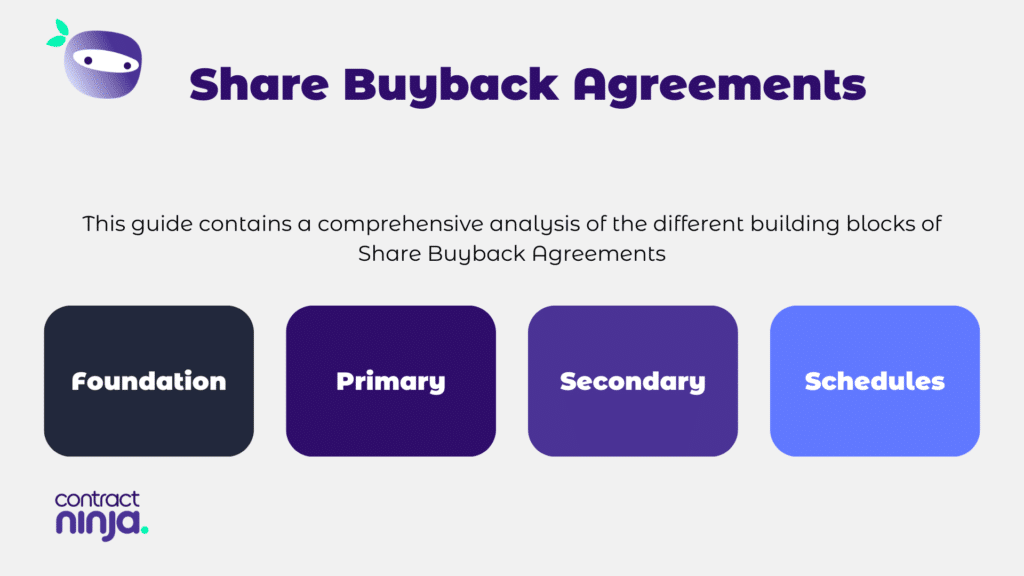Home » Building Blocks » Foundation » A Complete Guide to Drafting Share Buyback Agreements

A share buyback agreement is used by a Company to repurchase its own shares from shareholders. A share buyback reduces the number of issued shares of the Company, which can have various implications for the Company and its shareholders and, depending the transaction, may require various consents and approvals.
Section 46 of the Companies Act, 2008
Whenever considering a Share Buyback transaction, the board of the Company must be sure that the Company will satisfy the solvency and liquidity test immediately after completing the transaction.
–
If a director fails to vote against the implementation of the Share Buyback transaction knowing that the transaction will not satisfy the requirements contemplated in section 46 of the Act, then the Director may open themselves up to possible personal liability as contemplated in section 77 (3) (e) (vi) of the Act.
Section 48 (8) (a) of the Companies Act, 2008
Section 48 (8) (a) of the Companies Act, 2008, determines if the shares are repurchased from a director or prescribed officer of the Company or a person *related to a director or prescribed officer of the Company, then a special resolution of the shareholders of the Company will be required.
–
*related” has a specific meaning in the Act (have a look at sections 1 and 2 (1) (a) to (c) of the Act)
–
–
Section 48 (8) (b) of the Companies Act, 2008
Section 48 (8) (b) of the Companies Act, 2008, stipulates that if the Share Buyback (considered alone, or together with other transactions in an integrated series of transactions), involves the acquisition by the Company of more than 5% of the issued shares of any particular class of the Company’s shares, then the requirements of section 114 and 115 of the Act, will apply. This means :
If the transaction involves the acquisition by the Company of more than 5% of the issued shares of any particular class (as contemplated in Section 48 (8) (b) of the Companies Act, 2008), then it is also important to consider whether the Company who is repurchasing its shares is a regulated company (as contemplated in Section 118 of the Companies Act, 2008).
–
Should the repurchase exceed the 5% threshold and the Company is a regulated Company, then the Company may not give effect to the Share Buyback transaction unless the TRP has issued a compliance certificate or exempted the transaction.
If the Company which reacquires its shares is also a regulated company, then there is also a possibility that a shareholder of the Company will need to make a mandatory offer to the other shareholders in the Company (as contemplated in Section 123 of the Companies Act, 2008).
–
The current “prescribed percentage” determined by the Minister is 35%.
–
The need to make a mandatory offer is best illustrated by way of an example:
–
Let’s say the Company has 4 shareholders:
–
The Company will be reacquiring Shareholder A’s shares. After the reacquisition, the shareholding will look as follows:
–
If the Company is a regulated company (as contemplated in Section 118 of the Companies Act, 2008), then Shareholder B will now have to make a mandatory offer to Shareholders C and D in accordance with Section 123 of the Companies Act, 2008. The reason for this is that Shareholders held less than 35% of the issued shares before the transaction, and after the transaction, Shareholder B holds more than 35% of the issued shares.
Share buyback transactions can be structured to either trigger capital gains tax (“CGT”) or to be treated as a dividend.
–
Should the buyback be structured as a dividend, the following considerations are relevant: Dividends are generally exempt from income tax in terms of section 10(1)(k)(i) of the Income Tax Act, 58 of 1962 (the “ITA”) and dividends paid to South African resident companies are exempt from dividends tax in terms of section 64F(1)(a) of the ITA.
–
Structuring a transaction in such a way that the proceeds from the divestiture be regarded as dividends holds various advantages, especially for South African resident companies. SARS has, however, started to tighten the rope on these types of transactions.
–
On 16 March 2015, SARS issued Government Notice No 38569, in terms of which the following arrangement has been identified as a ‘reportable arrangement’ for purposes of sections 35 and 36 of the Tax Administration Act, 28 of 2011 (the “TAA”):
Any arrangement in terms of which-
(a) a company buys back shares on or after the date of publication of this notice from one or more shareholders for an aggregate amount exceeding R10 million; and
(b) that Company issued or is required to issue any shares within 12 months of entering into that arrangement or of the date of any buy back in terms of that arrangement.
–
Furthermore, paragraph 43A of the Eighth Schedule to the ITA (the so-called “anti-dividend stripping rules”) can treat exempt dividends received that arise from share buybacks, that meet certain criteria, as proceeds for CGT purposes.
–
With the introduction of Paragraph 43A(4) of the Eight Schedule to the ITA, care should also be taken when share subscription transactions are entered into as those transactions now also fall within the ambit of the anti-dividend stripping rules.
–
Furthermore, should the Seller in the transaction realise a capital loss Paragraph 19 of the Eight Schedule to the ITA should also be considered as it could have the effect of clogging the capital loss realised.
Seller
The Seller is the shareholder whose share will be repurchased by the Company.
–
Company
The Company repurchase the shares from the Seller.
Preamble sections provide insight into the context and objectives of the Share Buyback Agreement. While they’re not a legal requirement and do not have direct legal implications, they can be helpful in clarifying the interpretation of the agreement’s operative provisions in the event of a dispute.
–
Share Buyback Agreements generally outline essential preamble elements relevant to any share buyback. Considering the unique nature and terms of the agreement, the parties may choose to incorporate more comprehensive details or opt to exclude some of the basic preamble elements.
Within a Share Buyback Agreement, certain conditions are specified that must be satisfied (or waived) before the transaction can proceed to closing. These conditions, termed “Conditions Precedent,” act as safeguarding mechanisms, ensuring that specific criteria are met before the transaction’s completion. If these conditions are not satisfied by a predetermined date, often referred to as the “long stop date”, neither party will be obliged to close the transaction. Let’s delve into some of the commonly included conditions:
–
Regulatory Approvals:
Depending on the nature and scale of the transaction and the jurisdictions involved, various regulatory approvals may be required.
Competition clearance: In transactions where the Company may have a significant market share and there is a change of control as result of the share repurchase, competition or antitrust authorities might need to assess and approve the deal to ensure it doesn’t hinder market competition.
Sector-specific approvals: Certain industries, like banking, telecommunications, or energy, have specific regulatory bodies that must greenlight transactions to ensure compliance with sector-specific regulations.
–
Approvals from third parties:
Third-party approvals are necessary when external entities have a say in the transaction due to prior contractual arrangements or vested interests.
Consent from creditors: If the Company has outstanding debts or loans, creditors might have to consent to the reacquisition of the shares by the Company.
–
Other commonly included conditions:
–
The Long Stop Date:
This is the ultimate deadline by which all conditions precedent must be satisfied or waived, as may be applicable. If any condition is not met by this date, the transaction will typically not proceed, and neither party will have the obligation to close. The long stop date acts as a safeguard, ensuring that the transaction doesn’t remain in limbo indefinitely and that parties have clarity on the transaction’s timeline.
Next, the Share Buyback Agreement provides for certain fundamental aspects, such as the number of shares being repurchased, the purchase price and the closing and effective date of the transaction.
–
This part also details the process which must be followed to close the transaction. For example, on the Closing Date, the Company must pay the Purchase Price and the Seller must return the share certificates relating to the shares being repurchased.
Confidentiality provisions in Share Repurchase Agreements are vital elements engineered to safeguard the sensitive information of the Parties, primarily the Company, during and subsequent to the transaction.
While court litigation is one pathway to resolution, it can be protracted, costly, and potentially detrimental to reputations of the Parties. This has fostered the inclusion of alternative dispute resolution (ADR) clauses in Share buyback Agreements. One specific method, particularly relevant to any calculation or valuations, is Expert Determination.
–
Expert Determination is a mechanism where disputing parties consent to appoint a neutral third-party expert to adjudicate specific issues. The process is typically swifter and less formal than court or arbitration proceedings.
–
Why opt for Expert Determination?
–
Process
The parties might pre-select an expert or concur on one when a dispute emerges. If they can’t agree, they might resort to a professional body (e.g., an accountancy institution) within South Africa to appoint an expert.
–
Each party tenders their arguments and pertinent documents to the expert.
–
The expert scrutinizes the submissions and may pose questions or solicit further information. Once satisfied, they make their determination.
–
The Share Buyback Agreement should stipulate whether the expert’s determination is binding. If binding, it’s typically final, with limited grounds for appeal or challenge.
–
It’s imperative to clearly demarcate the scope of the expert’s mandate. They should solely be resolving the specific technical issue and not broader contractual disputes.
–
The chosen expert should be neutral and not have any prior engagements or conflicts of interest with either party.
–
Who bears the cost?
Generally the cost issue is left to the expert to determine and parties may be require to contribute equally to costs before the expert determination begins.
–
Conclusion
Incorporating expert determination clauses in Share Subscription Agreement, especially for technical accounting or financial disputes offers an efficient, cost-effective, and technically sound resolution mechanism. Parties should, however, clearly define its scope, process, and implications in their agreement to ensure clarity and fairness.
View the detailed guide on boilerplate ↗
–
Boilerplate bocks, while often considered standard, play a vital role in shaping the overall legal framework of a contract. As such, it is imperative to give these provisions careful consideration and ensure they align with the parties’ intentions and objectives. Neglecting the importance of boilerplate block can lead to unforeseen consequences and potential litigation.

Master Contracts, elevate your career. Join the global movement of shaping the standard of contracts.
South Africa
194 Bancor Avenue Menlyn, Colab Building, Waterkloof Glen, Pretoria, 0181
United States


Form part of the spearhead movement of shaping the global standard for tech contracts.